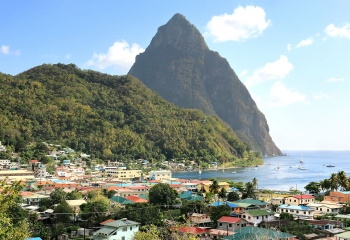Officials from the Caribbean Development Bank (CDB) were in Saint Lucia earlier this week to launch two milestone projects that will improve water access for more than 100,000 residents who live in some of the most underserved areas of the country. The launch of the John Compton Dam Rehabilitation and Vieux Fort Water Supply Redevelopment projects will help end acute water shortages that have threatened the livelihoods of residents and stymied the growth of businesses in the north and south of Saint Lucia. The projects aim to provide an efficient, reliable, climate-resilient water supply to the two areas. “We are pleased to support these two projects, which, when completed, will improve water access for the people who need it most and stimulate economic growth and social development in Saint Lucia," said Andrew Dupigny, Division Chief, Economic Infrastructure Division, CDB. Andrew Dupigny, Division Chief, Economic Infrastructure Division, CDB, speaks during the John Compton Dam Rehabilitation Project launch in Saint Lucia. Boosting the Water Supply in Northern Saint Lucia The John Compton Dam Rehabilitation Project aims to improve the reliability of water supply during the dry season for 93,000 residents in the northern districts of Castries, Gros Islet and part of Anse La Raye. Over time and after periods of heavy rainfall, silt has accumulated in the Dam, causing it to operate below capacity. Fixing the dam will ease the social and economic disruption by contributing to: better public health and quality of life for residents; reduced disruption and losses to businesses and schools due to water outages; and improved resiliency to severe rainfall events. The John Compton Dam Rehabilitation Project is supported by funding of USD14.798 million provided by CDB, the Inter-American Development Bank and the European Investment Bank (EIB). The John Compton Dam in Saint Lucia, which is being repaired as part of the John Compton Dam Rehabilitation Project. The Caribbean Development Bank launched the project in Saint Lucia on November 24, 2015. Tackling Water Challenges in Vieux Fort Vieux Fort, already home to an international airport and the national stadium, is on track to become a critical region for economic growth. However, serious challenges related to the quantity and quality of the water supply in the area place Tourism and commercial development plans at risk. The Vieux Fort Water Supply Redevelopment Project aims to address these challenges by not only upgrading to the water supply infrastructure, but also by improving the practices in the Vieux Fort River watershed. It also includes a component to implement measures to deal with the issue of non-revenue water‚Äîwater lost through leaks or that is not billed to customers. The project is supported by a loan of USD19.675 million provided through funding by CDB and EIB. From left to right: The Hon. Dr. Kenny Anthony, Prime Minister; Sen. Hon. Dr. James Fletcher, Minister for Sustainable Development, Energy, Science and Technology; and Andrew Dupigny, Division Chief, Economic Infrastructure Division, CDB, chat during the launch of the Vieux Fort Water Supply Redevelopment Project at the National Skills Development Centre in Saint Lucia. EIB support is provided under the Climate Action Line of Credit, which funds climate action projects in CDB' Borrowing Member Countries. Through the projects, CDB will help the Saint Lucia Water and Sewerage Company, Inc. (WASCO) prepare to address climate change challenges such as increased frequency and severity of droughts and heavy rainfall events. They will also build the capacity of WASCO in the area of gender inclusion, a central theme in CDB projects. Deutsche Gesellschaft f√ºr Internationale Zusammenarbeit (GIZ), Germany' agency for international cooperation, helped fund feasibility studies for both projects. Since 1970, CDB has approved approximately USD375 million in concessional loans and grants for Saint Lucia to help improve water and sanitation, transport infrastructure, drainage and flood mitigation, health, housing and education.

